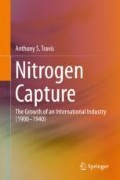Abstract
From 1918, BASF prevented access to the Haber-Bosch process and declined multiple requests for operating licenses. The clear preference for promoting its product, ammonium sulphate, rather than its technology, created a barrier that stimulated research elsewhere, based on the availability of cheap electrical power, the application of sophisticated engineering techniques equal to those of Germany, and alternative routes to pure hydrogen.
References
Travis AS (2017) Globalising synthetic nitrogen: the interwar inauguration of a new industry. Ambix 64(1):1–28, on 24–26.
IG Farbenindustrie AG (v.Knieriem & Brendel) to Reichsminister der Justiz Dr. Gürtner (20.Nov.1933), in Bundesarchiv Berlin, BArch, R8128/1420: Bestand IG Farbenindustrie AG, Verbindung zum Heereswaffenamt [Juli 1931–Nov. 1936], pp 93–94.
Food shortages (2017) Financial Times (20 February).
Saha M, Schmalzer S (2016) Green-revolution epistemologies in China and India: technocracy and revolution in the production of scientific knowledge and peasant identity. In: Phalkey J, Tong L (eds), Science of giants: China and India in the twentieth century. BJHS Themes 1:145–167.
Author information
Authors and Affiliations
Rights and permissions
Copyright information
© 2018 Springer International Publishing AG, part of Springer Nature
About this chapter
Cite this chapter
Travis, A.S. (2018). Conclusion. In: Nitrogen Capture. Springer, Cham. https://doi.org/10.1007/978-3-319-68963-0_20
Download citation
DOI: https://doi.org/10.1007/978-3-319-68963-0_20
Published:
Publisher Name: Springer, Cham
Print ISBN: 978-3-319-68962-3
Online ISBN: 978-3-319-68963-0
eBook Packages: Chemistry and Materials ScienceChemistry and Material Science (R0)

